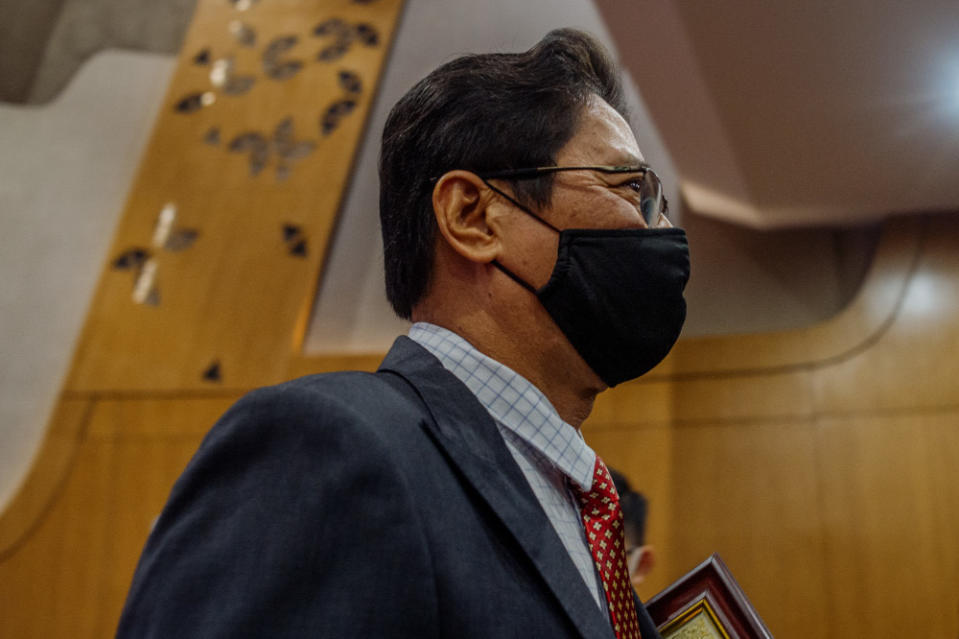DAP: Law against proxy trading broken if SC finds no wrongdoing even with MACC chief’s admission

KUALA LUMPUR, Jan 18 — The Securities Commission’s (SC) failure to find fault with Tan Sri Azam Baki even with his admission of facilitating proxy trading has effectively rendered Section 25(4) of the Securities Industry (Central Depositories) Act 1991 (SICDA) “impotent and broken”, said Lim Guan Eng.
In a statement today, the DAP’s secretary-general said the SC’s statement on the Malaysian Anti-Corruption Commission (MACC) chief commissioner’s share trades would erode investor confidence and create doubt over the commission’s independence.
The SC today said it has finished its investigations concerning the acquisition of public shares by Azam and found no conclusive evidence of wrongdoing.
“Malaysians are upset at the regulatory and enforcement failure of the SC in being unable to conclusively establish that MACC chief Azam Baki has committed a breach under section 25(4) of SICDA, after initiating investigations on January 6, 2022. Such regulatory and enforcement failure by the SC contradicts its legal duty as a self-funded statutory body entrusted with the responsibility to regulate and develop the Malaysian capital market, particularly rule-making and enforcing regulations pertaining to the capital market.
“How can the SC perform its statutory duty if the SC cannot establish that Azam has breached Section 25(4) of SICDA, when Azam has openly and publicly admitted that he had allowed his brother to conduct proxy share trading? Like every developed capital market in the world, Section 25(4) SICDA has outlawed proxy share trading by providing that a trading account must be opened in the name of the beneficial owner or authorised nominee,” the Bagan MP said.
He pointed out that the SC in its statement today did not disclose whether Azam’s brother, Nasir, had a share trading account at the same time, why there was a need for a proxy trade, and how the purchase was funded.
“Azam was a significant holder of warrants in the public-listed company Excel Force MSC Sdn Bhd as of March 2016, when he was head of the MACC investigations department. In his share trading account, Azam has bought millions of shares and warrants in public listed companies with a value well over the RM100,000 cap on equity holdings to be held by civil servants.
“If the SC is unable to act on proxy share trading then it should also explain action taken against at least three individuals who were charged and penalised under Section 25(4) of SICDA with millions of ringgit in fines in the past. This is clearly double-standards. Is SC going to return the fines they have paid and apologised for prosecuting them?” Lim questioned.
Separately, Selangor DAP chairman and Puchong MP Gobind Singh Deo also criticised the “one lined” statement by the SC as insufficient, and demanded further explanation.
“Explain who was called in to assist in the inquiry, what the inquiry revealed, what impact the evidence had on the law applicable and why you are unable to conclude whether a breach occurred. Reasons should be given in support of any decision.
“All the more reason for a PSC hearing to be held on an urgent basis. The SC should also be called in to assist and explain their position at that hearing,” he added, referring to the Parliamentary Select Committee on Agencies under the Prime Minister’s Department.
Azam said in a press conference earlier this month that he had allowed his younger brother to use his stock trading account to buy millions worth of shares in two public-listed companies back in 2015.
He denied any wrongdoing, saying the amount has since been transferred to Nasir’s account. However, he has not explained publicly why Nasir had to use his account to buy those shares.
On January 8, Azam said he is ready for his alleged misconduct case to be referred to the MACC’s Complaints Committee.
Yesterday, it was reported that the PSC meeting to discuss the MACC chief’s involvement with stock ownership has been postponed, following Azam’s refusal to meet its members. He had argued that he was already being investigated by the SC and the MACC Complaints Committee.
Earlier today, the “Catch Azam Baki” movement announced that it would be organising a peaceful street protest, citing disappointment over the apparent inaction against Azam.
In a statement, the movement, made up of civil societies and political parties, said the protest will take place at 11am on January 22 in front of the Sogo shopping mall in Kuala Lumpur.
The movement also chided Azam for trying to avoid addressing “structural issues” by refusing to cooperate with the PSC for Agencies under the Prime Minister’s Department on his stock purchasing activities.
It added that Azam had instead decided to file a RM10 million lawsuit against Lalitha Kunaratnam, who is a Malaysian correspondent with the Asia-based Independent News Service, for exposing the details of said activities in two reports.
Related Articles Guan Eng: MACC chief’s stock trading saga turning into ‘a hydra of lies’ PM tells all parties to accept SC’s decision on Azam Baki share trading saga Securities Commission says Azam Baki was in control of account he said his brother used


